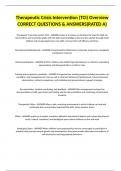Therapeutic Crisis Intervention (TCI) Overview
CORRECT QUESTIONS & ANSWERS(RATED A)
Therapeutic Crisis Intervention (TCI) - ANSWER system is to reduce or eliminate the need for high risk
interventions and to provide adults with the skills and knowledge to become the catalyst through which
children and young people learn new skills, increase their self-efficacy and thrive
Developmental Relationship - ANSWER characterized by attachment, reciprocity, progressive complexity,
and balance of power.
Clinical participation - ANSWER ICSP for children who exhibit high-risk behaviors is critical to responding
appropriately and therapeutically to a child in crisis.
Training and competency standards - ANSWER Comprehensive training program includes prevention, de-
escalation, and management of crises as well as child and adolescent development, trauma-informed
interventions, cultural competence, and individual and group behavior support strategies
Documentation, incident monitoring, and feedback - ANSWER Data management includes the
documentation of staff supervision and training and the documentation and monitoring of behavioral
incidents
Therapeutic Milieu - ANSWER offers a safe, nurturing environment in which children can heal and
continually learn and practice important life skills. Grow, develop, thrive.
Milieu - ANSWER made up of people, emotions, attitudes, and physical objects and is about the physical,
social, cultural, emotional, and ideological space where children can live and work
Ideological Space - ANSWER When children have opportunities and are encouraged to participate in
activities that promote normal growth and development, they learn positive alternatives to patterns of
self-destructive and inappropriate behaviors.
, Physical Space - ANSWER Creating a trauma-informed physical setting promotes a sense of safety, fosters
healing, encourages play and relationship building activities, reduces stress and anxiety, and provides a
positive working environment.
Cultural Space - ANSWER Being culturally competent is a developmental process beginning with self-
awareness and leadid to the building of skills that result in culturally responsive behavior
Emotional Space - ANSWER Helping children to learn to manage their emotions and providing them with
a sense of safety, their stress responses are easily triggered resulting in overwhelming feelings of fear,
anger, and frustration in addition to volatile behavior
Setting conditions - ANSWER anything that makes challenging behavior and traumatic stress responses
more or less likely to occur
Use Of Self - ANSWER Self-awareness, self-regulation, relationship skills and attunement, self-care
Self-regulation - ANSWER ability to regulate one's behavior, emotions, and thoughts in order to achieve a
longer-term goal.
relationship skills and attunement - ANSWER to develop the relationship we need to be able to listen and
engage the childe, tune in to what the child is saying and feeling, be aware of the feelings that are being
evokes, respond to the child, and be attuned to how the child is experiencing us
Attunement - ANSWER being aware of a child's emotions and responding with words and actions based
on the child's emotional state
Self-care - ANSWER if we have good self-regulation skills and many productive and socially appropriate
ways to cope with stress, we can better take care of ourselves. These stress-reducing strategies include
exercise, cry, relax, problem solve, listen to music, and talk to friends.
Triune Brain Model (in order of labels) - ANSWER Thinking, Emotional, Survival Brain




